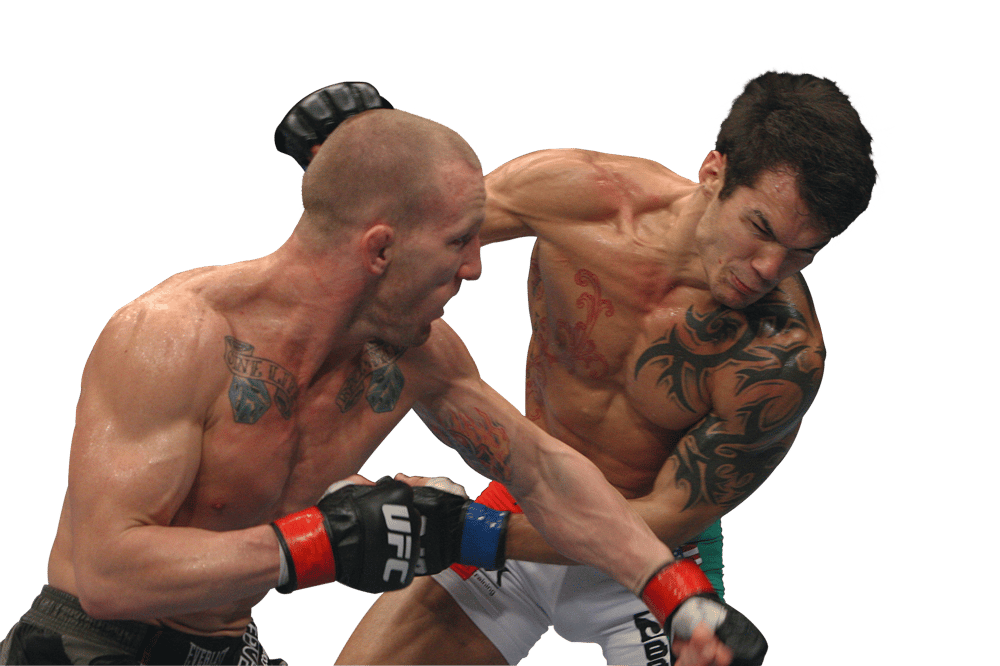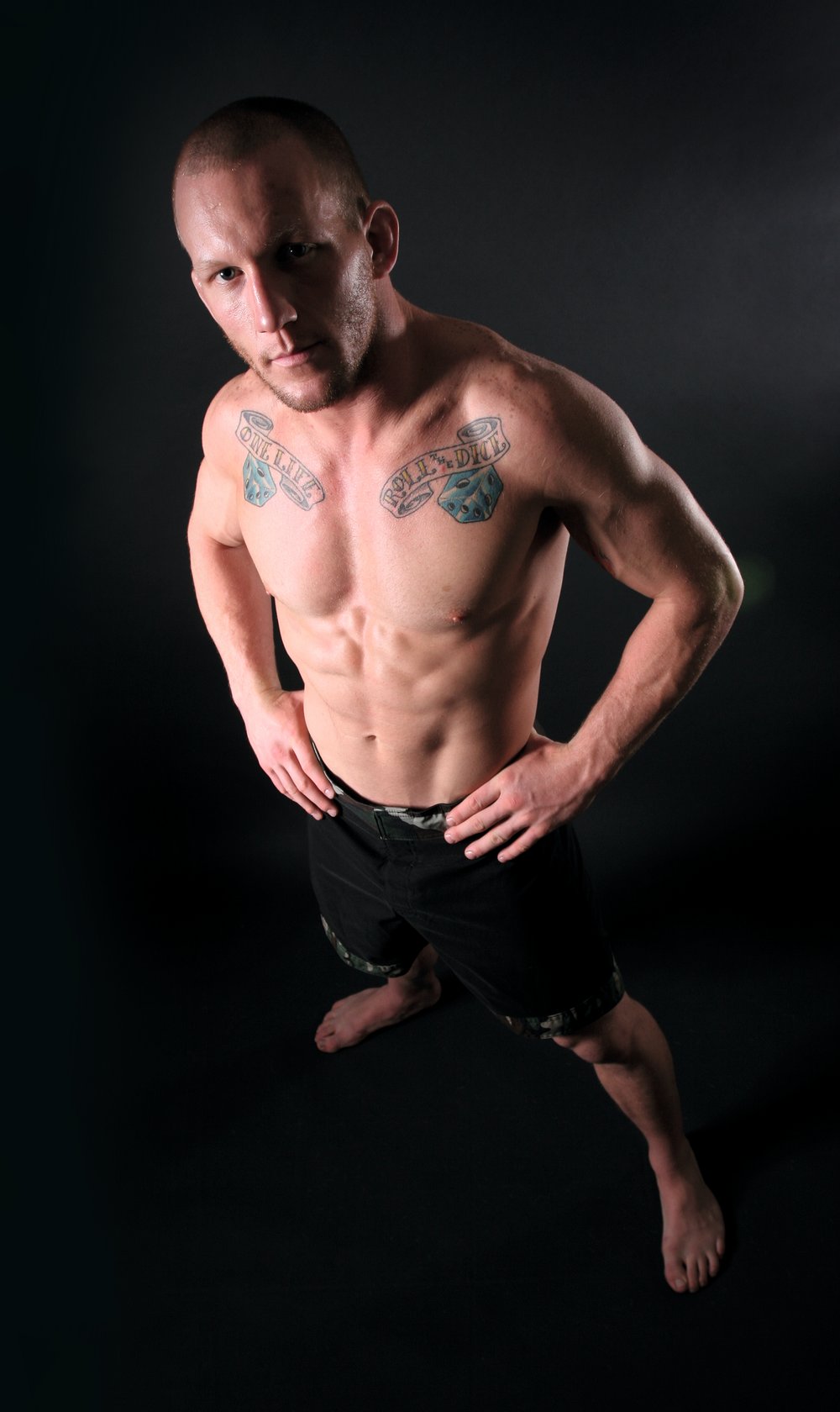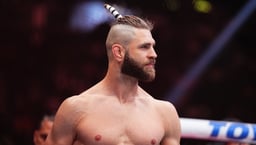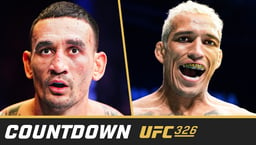
Issue 069
December 2010
Uncompromising lightweight powerhouse Gray Maynard has finally secured his title shot against Frankie Edgar, a man he’s beaten before. FO swung by chez Maynard and found even more reasons for the champ to cower.
At the age of three, Gray Maynard made up his mind he would learn how to ride a bike. Although his father, Jan, felt his son was young for such a task, he took him to a nearby lot where the ground was flat and there would be little traffic to disturb him. By the time the two left for home, both of Maynard’s knees and elbows were skinned raw. His face was stained with tears and the sun had already set. But, sure enough, he knew how to ride that bike. That is why, when Gray eventually meets current lightweight champion Frankie Edgar in the Octagon early next year, Jan admits he likes his son’s chances. “I’ve always told Gray, ‘If you get to the finals there’s no one that can deny you,’” Jan says. “‘You’ve worked so hard for so long. When you get there whoever’s waiting for you is going to have a fight on their hands.’”
His nickname ‘The Bully’ refers to his fighting style rather than his childhood. But the 31-year-old number one UFC lightweight contender, Gray Maynard, has always been a grinder. By the time he was a freshman at Bonanza High School in Las Vegas, nearly every decision Maynard made was done so with the goal of becoming an NCAA champion in mind. He transferred out of Bonanza as a sophomore for another local high school with a stronger wrestling program.
When that one also failed to meet his standards he asked his parents’ permission to enroll in an all-boys school in Lakewood, Ohio. When Maynard joined the Michigan State University wrestling program in the Fall of 1998, a big part of him felt the road to his ultimate goal was already complete. “I thought I was guaranteed to be at least a two or three-time NCAA champ,” he says. “If I wanted four, I thought that would take some hard work. But we’d sit around at practice and I’d say, ‘Yeah man, I’m going to be a champion.’” Instead, he finished eighth at the NCAA championships in his second year and seventh as a junior and senior. His dream of winning an NCAA championship was dead. Even if he thought he was the best 157lb wrestler in the country, his chance to prove it was over.

Maynard was 22 years old when he competed in what would be the final wrestling match of his life. Even at a young age he knew a significant part of his life was done. “People would say to me, ‘Gray, you beat this guy and this guy.’ I don’t know that stuff though. I just know who I lost to.” After considering a run at the 2004 Olympic team, Maynard eventually picked up his things and moved back to Las Vegas. He found a job selling real estate and started making good money. To those who didn’t know him, he probably seemed like a pretty satisfied guy. Behind the scenes, however, Maynard says he struggled adapting to a life without physical competition. He dabbled with a jiu-jitsu class at the Cobra Kai gym under Marc Laimon, but the easy-going atmosphere of the practices made it feel more like a hobby than a sport. “When I came home I knew I was done with wrestling,” Maynard said. “I coached a couple of kids in it and I had a job but I didn’t know what to do with that part of me. I was irritable. I snapped at my parents. I just didn’t have a place to channel that craziness. I was put on this earth to compete.”
Gray found the outlet he was looking for in 2005 when he joined the camp of former UFC heavyweight and light heavyweight champion Randy Couture. Couture was in the middle of training for his second fight against Chuck Liddell, at UFC 52, and Maynard found a place in his team alongside guys such as Mike Pyle, Jay Hieron, and Forrest Griffin. Although he had already been introduced to the sport on a previous trip to Hilo, Hawaii, to help BJ Penn with his takedown defense, Maynard’s official start in mixed martial arts came at the Couture camp. By late 2006, with a little help from Rashad Evans and Kendall Grove, he had been offered a spot on the fifth season of The Ultimate Fighter reality series. “When I got with Couture, that’s when it clicked,” Maynard said. “They trained for real there and that’s when I was like, ‘Alright, now I understand this sport.’ I fought an amateur fight against Evan Dunham that March and then Rashad and Kendall got me an interview for The Ultimate Fighter. I wasn’t real happy about being on a reality show but it was a chance to fight the top guys.” After being submitted by Nate Diaz in the semifinals of the show, he hasn’t lost since and claimed the number one lightweight contender position with a win over Kenny Florian at UFC 118 in August.
His critics would say that, really, Maynard’s wrestling career never ended at Michigan State – because his style of fighting is to take an opponent down and hold him there. Of his ten professional wins in mixed martial arts, all but two have come by way of decision. Sitting at the kitchen table of the Las Vegas home he shares with his longtime girlfriend and two dogs, Maynard nods when the topic of his ‘boring’ style comes up. As he’s done in interviews before, he says it’s not easy to finish the kind of competition he’s faced in the UFC – Florian, Rich Clementi, Jim Miller, Roger Huerta, Nate Diaz. (Ironically, Maynard knocked out Joe Verres in nine seconds at UFC Fight Night 11, the third-fastest KO in UFC history.)

After a poignant pause, Maynard adds he thinks the fans out there only concerned with the finish are missing out on some terrific fights. “I think people are caught up in the decisions thing, like, ‘I can’t believe it’s another decision,’” he said. “A lot of them aren’t real fight fans. They’re fans of two or three guys like Anderson Silva and Brock Lesnar. They don’t stop and watch the fight. There’s a lot more there than just two guys throwing. That’s why, sometimes, I don’t really care. You think I’m boring? You can think that. You’re not a fight fan.” Maynard also doesn’t understand how he can be criticized for relying too much on his wrestling when three of his last four fights have been nearly all stand-up. Although his game plan was built around takedowns in the Florian fight, Maynard says he planned to use striking in his fights against Diaz, Huerta and Miller. “They say, ‘He just takes people down,’ but before Florian my last three were all stand-up,” Maynard said. “I think people believe what they hear and not what they see.”
While Maynard’s team has encouraged him to keep his focus on winning and not playing to the crowd, a few of those he trusts have told him he would have received a title shot long ago if he simply would have asked for it. It’s no secret that, throughout the days of combat sports, fighters have earned their way into marquee matchups by grabbing the microphone and shouting a name on national television. During his trip to Boston for UFC 118 he stayed at the same hotel as light heavyweight Tito Ortiz, who was in town for the Fan Expo. At one point that week, Maynard said he watched Ortiz do sprints up and down the stairs of the main lobby in the hotel, just to be at the front and center of attention to any fans milling about. In some ways, Maynard admits, he wishes he could be more like that. He doesn’t have anything against the fighters that call out an opponent in front of a sold-out crowd. He just can’t do it. “I guess that’s a good thing to do, to have your name out there,” Maynard said. “I don’t know. It’s just not me. I don’t like it to seem like I want the whole world to know I’m calling some guy out. I want one guy to know that, and that’s (UFC matchmaker) Joe Silva, because he’s the guy that takes care of the fights.”
As it turns out, Maynard is happy with the way things have played out. He’s expecting to fight for the UFC lightweight title as soon as January and will be taking on a fighter he previously defeated by unanimous decision in 2008. The memory of falling short of a national title in wrestling keeps him from being overconfident, but there’s no doubt that, in the eyes of the fighter, his family, and his camp, this is Maynard’s fight to lose. Despite the fact Edgar also holds a strong wrestling background, Maynard remembers taking him down easily and holding a significant size advantage in their first fight. While much has been made about the improvements Edgar has made since then, the same could be said for Maynard. Especially in regards to his striking, as that fight was his first under boxing coach Gil Martinez.
“They talk about how much Frankie has improved, but Gray was barely learning how to throw punches at the time of that fight,” Martinez says. “Gray has improved twice as much as Frankie. I was a little frustrated when he wasn’t getting the title shot when we thought he should, but patience is important. We feel confident about this fight and it’s going to be a long time before anyone can take that belt away from Gray.”
At the moment Maynard’s hand was raised at UFC Fight Night 13 in Broomfield, Colorado, he admits he would have never thought Edgar was anything more than just another guy he fought on the way to the title. That perception changed a little when he watched Edgar outpoint Sean Sherk at UFC 98. And after watching him frustrate BJ Penn at UFC 112 earlier this year, Maynard said he was expecting Edgar to hold on to the belt in an August rematch.
What he wasn’t expecting was to run into Edgar the night before UFC 118 in Boston. After making weight that Friday, both fighters gathered their families and just so happened to walk into the same Italian restaurant for dinner. Despite the fact both were considered the underdog in their respective fights the next day, it was almost as if everyone in the restaurant that night got let in on a secret of the next 155lb title bout. The owner of the place asked the two to square off for a photo. The two fathers made a pact they would discourage their sons from trash-talking one another before the fight. And, of course, Maynard got to get a closer look at the man he figured was standing in the way of accomplishing his current biggest goal in life.
A small detail in this story is of a college wrestler from Northern Illinois named Scott Owen, who ended Maynard’s dream of becoming an NCAA champion when he defeated him 6-4 in overtime of their 2003 quarterfinals match. Owen and Edgar have something in common, in that Maynard beat them both the first time he competed against them. Seven years after a heartbreaking end to his college wrestling career, Maynard will have a chance to take some of the sting away from one of the few things in his life he set out to do but failed to accomplish. The thing is, however, he doesn’t want the sting to go away. Because as good as it felt the night he learned how to ride a bike at three years old, that feeling never drove him to accomplish something else.
The feeling that came that night in 2003 did motivate him. “I think how I felt after the match with Scott Owen will stay with me for a long time,” Maynard said. “Forever, in fact, because I want to have it. That pain, you have to know it. I try to hold on to it because it drives me. I don’t ever want that to happen again.”










